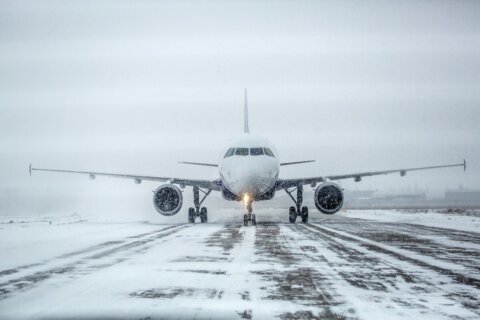This article was reprinted with permission from Virginia Mercury.
Key members of Congress announced an agreement Monday on a $105 billion bill to reauthorize the Federal Aviation Administration for five years ahead of a May 10 deadline.
The 1,000-page bill would raise hiring targets for air traffic control and would codify in law a rule the Biden administration introduced this month requiring airlines to offer refunds for canceled or significantly delayed flights, among other consumer-focused provisions.
The legislation also would add flights to Ronald Reagan Washington National Airport, despite opposition from U.S. senators from Virginia and Maryland who said in a letter Monday the move would hurt safety efforts.
The compromise measure was negotiated by U.S. Senate Commerce, Science and Transportation Chair Maria Cantwell, a Democrat from Washington state, and ranking Republican Ted Cruz of Texas and U.S. House Transportation and Infrastructure Chair Sam Graves, a Missouri Republican, and ranking Democrat Rick Larsen, a Washington Democrat.
The four lawmakers released a joint statement announcing the agreement early Monday praising their “bipartisan, bicameral, comprehensive agreement.”
“The American people deserve nothing less than the safest and most efficient aerospace system in the world, and to that end, our bill provides critical safety enhancements, grows America’s aviation workforce, invests in infrastructure at airports of all sizes, sets clear priorities for advancing innovative aviation solutions, improves the flying public’s travel experience, and ensures a healthy general aviation sector for years to come,” the lawmakers said.
The bill would authorize $66.7 billion to fund key safety programs such as aircraft safety certification and the hiring of air traffic controllers and technical engineers. It would also authorize $19.35 billion for infrastructure improvements. It would more than double annual funding for the Essential Air Service program that subsidizes flights to small rural airports.
No votes have been scheduled in either chamber on the measure, which President Joe Biden must sign by midnight on May 10 to avoid a lapse in FAA authority.
Washington National Airport
With endorsements from committee leaders on both sides of the aisle, the bill should have broad bipartisan appeal in both chambers of Congress.
But senators from the states bordering Washington, D.C., said Monday they opposed the provision adding five incoming and five outgoing flights to Washington’s Reagan National Airport, or DCA, located in Northern Virginia just across the Potomac River.
In a statement, Democratic Sens. Mark Warner and Tim Kaine of Virginia and Ben Cardin and Chris Van Hollen of Maryland vowed to “continue to fight against this ridiculous and dangerous provision.”
Two planes cleared to take off from the busy airport came within 400 feet of crashing in an April 18 incident. The near-miss should have underscored the crowded conditions at DCA, which, as the closest airport to the Capitol, is a favorite of members of Congress, the senators wrote.
Committee members, none of whom are from the area, “decided to ignore the flashing red warning light of the recent near collision of two aircraft at DCA and jam even more flights onto the busiest runway in America,” the senators said. “It should go without saying that the safety of the traveling public should be a higher priority than the convenience of a few lawmakers who want direct flights home from their preferred airport.”
Because the federal government owns DCA and Dulles International Airport further into the Northern Virginia suburbs, Congress has the power to make operational changes.
Consumer provisions
The bill includes several provisions meant to protect consumers.
It would establish in law a rule the Biden administration proposed this month to require airlines to offer cash refunds for flight delays of more than three hours for domestic flights or six hours for international travel.
The Biden administration had sought such a measure, even as it pursued the rule.
It would also require airline credits to be effective for at least five years, bar airlines from charging families to sit together and require the Transportation Department to create a digital dashboard of the minimum seat sizes for U.S. airlines. It does not mandate a national standard for seat size, but it does direct the FAA to decide if a rule on the issue is needed.
The legislation would establish a Senate-confirmed position of deputy secretary for consumer protection, who would run a new office with an annual budget of $14 million dedicated to consumer issues.







